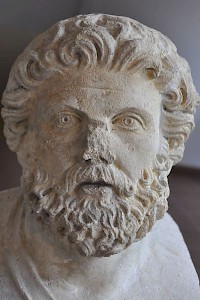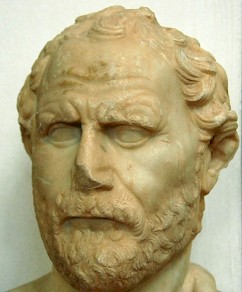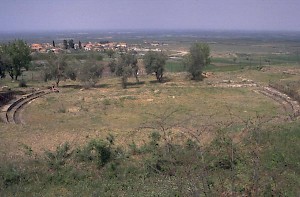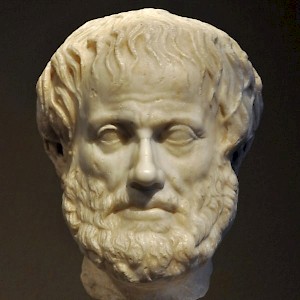Macedonia (5)
Q83958Macedonia: ancient landscape and state, situated in the Former Yugoslav Republic of Macedonia and northern Greece, best known because its king Alexander the Great (r.336-323) conquered the Persian Empire and inaugurated a new period in Greek history.
Philip

Macedonia had been plunged into a crisis after the death of Archelaus in 399, but recovered when the young Perdiccas III became king in 365. At first, he appeared as weak as his predecessors, and the Athenians were able to force him to cooperate with them in an attempt to conquer the city of Amphipolis. Once this strategically important city had been captured, however, Perdiccas kept it for himself and broke off the collaboration in a move for which his ancestor Perdiccas II (above) would not have felt ashamed.
Amphipolis controlled important gold mines, and from now on, the king was a rich man, wealthier than any of the barons of Upper Macedonia. He now had the means to recruit large armies without being dependent on others, and could pursue the hellenization policy that had been initiated by Alexander I (above). Immediately, Perdiccas invited the Athenian Callistratus to reform the Macedonian economy and toll system. He was not the only Athenian who went to the north: Euphraeus, a student of Plato, settled in Pella as court philosopher. However, Perdiccas would not see the edifice for which he had laid the foundations, because in the last weeks of 360, his army was defeated by the Illyrian king Bardylis. The young Macedonian king was killed in action.
He was succeeded by his brother Philip II (360-336), who had lived in Thebes and had studied Epaminondas' use of the phalanx. Once Philip had become king, he embarked upon a very efficient policy of conquest. Although he briefly gave up Amphipolis to regain Athenian support and avenge himself upon the Illyrians, he seized the town again at the earliest possible occasion, promised it to the Athenians under the condition that they would give him the port of Pydna, and in the end kept both towns. Like other Greek poleis that Philip captured, they retained some of their autonomy and Greeks in Macedonian service could proudly continue to call themselves after their home towns: Aristotle of Stagira, Callisthenes of Olynthus, Nearchus of Amphipolis.
Philip had read the signs of the times. The allies of Athens were about to revolt (the "Social War"; 357-355) and the Athenians were unable to punish the Macedonian king, who proceeded to capture other Greek towns in the neighborhood, improved his army, pacified the Illyrians, allied himself to the Molossians of Epirus (by marrying Olympias), defeated the Thracians, intervened in the Third Sacred War (355-346), and gained control of both Thessaly and a vote in the council that controlled the oracle of Delphi (the Amphictiony). Without any doubt, the king of Macedonia had become the most important man in the Greek world.

The Athenian orator Demosthenes, who hated Philip like the gates of hell, called him a barbarian and tried to win the Greeks for a united anti-Macedonian policy. He could not prevent Philip's capture of the important city of Olynthus (348), however, because other Greeks acquiesced in the rise of Macedonia. Not only was its king allowed a vote in the Amphictiony, but he was also permitted to compete at Olympia.
The Greeks recognized him as "one of us". The attitude is summarized by the orator Isocrates, who tried to convince Philip not to follow up his successes by the conquest of Greece, but to lead the united Greek towns in a war against the barbarian Persians. Isocrates congratulates the king that his ancestors had not tried to become monarchs in Greece, but instead
left it and devoted themselves to establishing a kingdom in Macedonia; for they knew that the Greeks were not accustomed to put up with monarchies, while the rest [i.e., the non-Greeks] were unable to order their life aright without such a form of government. The result was that [...] their rule was one of quite a different character from the rest; for they alone among the Greeks claimed to rule over a people not of kindred race.note

In other words, if Philip proceeded to conquer the Persian barbarians, he was merely continuing the family tradition to conquer nations "not of a kindred race". As it turned out, Philip appreciated the suggestion, but he judged it better to subdue the Greeks first. In 340, he provoked a crisis, and in 338, he mopped up the last Greek resistance in the battle of Chaeronea. At the same time, the Persian king Artaxerxes III Ochus died (text). It was the perfect moment for an Asian expedition, and the Macedonian king forced the Greeks to join a military alliance (the Corinthian League) to attack Persia. However, Philip was assassinated before he could leave (text). The Asian campaign was to be led by his famous son Alexander.
The historian Arrian of Nicomedia says that Philip
found the Macedonians wandering about without resources, many of them clothed in sheepskins and pasturing small flocks in the mountains, defending them with difficulty against the Illyrians, Triballians and neighboring Thracians. He gave the Macedonians cloaks to wear instead of sheepskins, brought them down from the mountains to the plains, and made them a match in war for the neighboring barbarians. He made his subjects city dwellers and civilized them with good laws and customs. He annexed much of Thrace to Macedonia, seized the most favorable coastal towns, opened up the country to commerce, and enabled the Macedonians to exploit your mines undisturbed.note

Although this is exaggerated, it is true that during the reign of Philip, Macedonia became a superpower. As a consequence, his crown prince Alexander was educated at an international court, where Macedonians, Greeks (e.g., Nearchus), Thracians, and even a couple of Persians (e.g., Amminapes and Artabazus) appear to have become more or less integrated. Religiously, Macedonia was an open society as well. A town like Aphytis boasted a sanctuary for Ammon, an Egyptian deity.
Those living in Philip's kingdom could, whatever their ethnicity, join his Companion Cavalry and receive land to maintain their horses. In fact, Philip created a new nobility that he used as a counterweight to the old barons. Still, although Philip was not obsessed with ethnicity, independent military commands were reserved to Macedonians (e.g., Parmenion and Attalus).
Philip's contemporary, the Greek historian Theopompus of Chios, put it well when he said that "Europe had never seen a man like king Philip, the son of Amyntas," and it is no coincidence that Theopompus called his books on the mid-fourth century BCE the Philippic History. It can be argued that not even Philip's son Alexander the Great has done so much to change the course of Macedonian and Greek history.